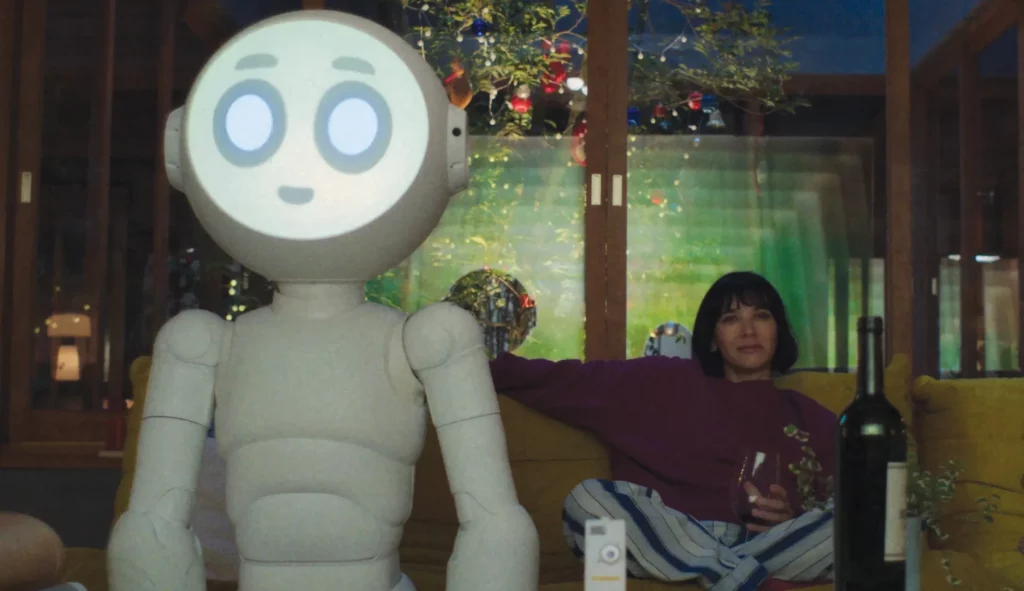
“His goal wasn’t teaching robots to discover their humanity,” the narrator of Sunny, an Apple TV+ dark dramedy set in near-future Kyoto, says about Masa, a robotics engineer who’s presumed dead after the flight carrying him and his son crashes in northern Japan. “What excited him was realizing how they could help us discover ours.”
Sunny, the brainchild of showrunner Katie Robbins and based on Colin O’Sullivan’s 2018 novel The Dark Manual, transcends the traditional gimmicks and set pieces of Japanese-themed cultural products designed for Western audiences — Zen gardens, Yakuza intrigue, even an entire episode taking the form of a game show — to yield a taut, visually stunning, thought-provoking cautionary tale.

The series begins with a grieving Suzie, an American transplant in Tokyo played brilliantly by a grim, withdrawn, and yet occasionally hilarious Rashida Jones. Amid the shock of losing her husband and son, Suzie receives an unexpected gift: a “homebot” named Sunny, a mysterious bequest from Masa, whom Suzie had mistakenly understood to be a peon at a giant electronics conglomerate called ImaTech.
At first, Suzie rages at Sunny, amusingly voiced in both English and Japanese by Joanna Sotomura, despite the homebot’s sincere efforts to comfort her. At one point, Suzie nearly tosses Sunny off a bridge into the scenic Kamo River. But as clues emerge that Sunny’s memory bank contains more than meets the eye, Suzie grudgingly, distrustfully accepts her assistance.
Accompanied by Mixxy, a hapless bartender played by Annie the Clumsy — yes, that’s the actor’s name — whom Suzie encounters one night while on a grief-driven bender, Suzie labors to unlock Sunny’s secrets, enlisting the help of a seamy underworld of “code dealers” in hock to organized crime to locate the “dark manual” that Masa supposedly drafted. Suzie also struggles with Noriko (a mischievous Judy Ongg), her mother-in-law who urges her to move on from the tragedy while concealing an unsavory past of her own.
Along the way, both Suzie and Sunny gradually come to understand and appreciate each other — and themselves. Sunny’s conduct matures over time as she learns more about the world and the people inhabiting it. At one point, she tries, but fails, to save the life of a hatchling she comes across in the forest. “I didn’t want this to happen,” Sunny laments when the young bird dies. “I was just trying to understand Suzie, her pain.”
For her part, Suzie learns to recognize Sunny for more than just her instrumental value. At one point, Mixxy chastises her growing fondness for the robot, arguably at the expense of Suzie’s human relationships. “There’s something really f***ed up,” Mixxy growls, more than a touch jealous, “about a person who cares more about a homebot than they do about people.”
We also learn about Masa’s journey in a series of flashbacks to his emergence from a dark period of hikikomori, a hermit-like depression, through the early development of robots — surely the finest episode of the series. His engagement with technology not only alleviates his loneliness but inspires him to improve machines to cure others of theirs. “You frown at objects that are valuable to you,” one of the robots he’s programming tells him, “because you value being sad.” In response, Masa (played delicately by Hidetoshi Nishijima) can only laugh, both at his human shortcomings and at his technical triumph.
During a recent trip to Japan, I interviewed Kenichi Yoshida, an executive at Softbank Robotics Group, a real-life version of ImaTech, which oversees the development of robots for use in the food and beverage, facility management, and logistics industries — think vending machines, tray dispensers, and advanced Roombas.
Japan, of course, is well-known for its advances in robotics, which represent both causes and symptoms of a certain societal comfort with, or at least tolerance of, machines not commonly found elsewhere in the world. Yoshida attributed this tendency to both the excellence of Japanese engineering, “combining information technology and physical products,” and an aging workforce increasingly light on low-skilled laborers.
CLICK HERE TO READ MORE FROM THE WASHINGTON EXAMINER
But what struck me most was when I asked him about the risks robots might one day pose. “Someone could set an evil objective,” he fretted, “to kill people.” And, worse, when it comes to “optimizing the objective, AI will do a good job. A really good job.” This real-life robot designer thus emphasized to me the importance of building safety mechanisms into both robots and society. Softbank’s CEO, and the second-richest person in Japan, is Masayoshi Son — it’s unclear if the fictional Masa was intended to evoke him.
Sunny follows a similar trajectory: We observe the technical virtuosity that enables Sunny and other homebots to provide invaluable assistance to the elderly, the lonely, and the needy. We marvel at the human brilliance they embody and the indispensable benefits they confer. But we also shudder at the risks they pose, at the dark powers they retain. If they have vices, Sunny suggests, it is because they are made in our image.
Michael M. Rosen is an attorney and writer in Israel and a nonresident senior fellow at the American Enterprise Institute. He is writing a book on AI and humanity.







